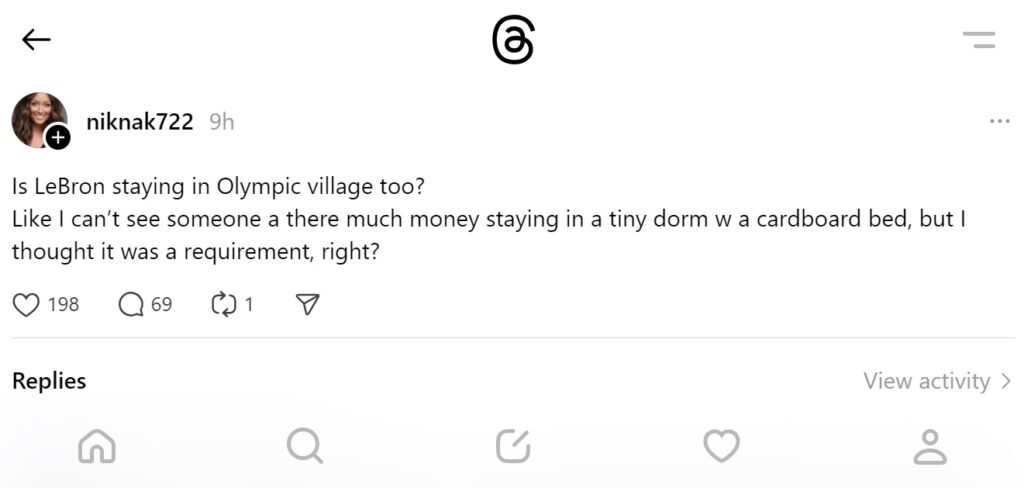The Paris Olympics have generated significant debate, as athletes have expressed their dissatisfaction with the living conditions in the Olympic Village. This village, intended to accommodate roughly 11,000 athletes, has faced criticism for its absence of air conditioning, uncomfortable cardboard beds, and insufficient food provisions.
Many athletes have taken to social media to air their complaints, pointing out problems like long waits for food, unreliable water access, and inadequate transportation options. The cardboard beds, which were introduced during the Tokyo Olympics as a sustainable alternative, have become a major source of frustration, leading numerous athletes to prefer staying in hotels.
The absence of air conditioning has emerged as a major concern, particularly with temperatures in Paris exceeding 90 degrees Fahrenheit. Athletes from nations such as Canada, Italy, and Denmark have turned to portable air conditioning units to help manage the heat.
The village’s reliance on a water cooling system, typical in many European locations, has not been adequate for ensuring athletes’ comfort. Furthermore, the limited availability of high-protein foods like eggs and grilled meats has raised alarms about nutritional needs, with some athletes claiming it has impacted their competitive performance.
Even with the presence of Michelin-starred chefs and a thoughtfully designed village meant for post-Games use, the living conditions have overshadowed these positive aspects. Amenities such as a two-story gym, a mental wellness center, and a nursery for athletes’ children have not been sufficient to counterbalance the negative experiences reported by many competitors. This situation has prompted questions about whether the accommodations are adequate and if athletes are being treated justly.
Social Media Demands Proof of LeBron James’ Living Conditions in the Olympic Village
The discussion regarding the living conditions at the Paris Olympics has taken an intriguing turn, with social media users demanding evidence that LeBron James is experiencing the same living conditions as other athletes. A post on Threads captured this sentiment well: “Is LeBron also staying in the Olympic village? I can’t picture someone with his wealth living in a cramped dorm with a cardboard bed, but I thought that was mandatory, right?”.


This comment has led to a wave of similar inquiries, with fans wondering if high-profile athletes like LeBron are facing the same circumstances as their fellow competitors.
The request for proof of LeBron’s living situation highlights a wider concern about fairness among athletes at the Olympics. Fans are suggesting that there may be discrepancies in treatment based on an athlete’s social standing within the sports industry.
The thought that a star like LeBron James could receive special treatment while other athletes suffer through inadequate conditions has resonated with the public. This perception of inequality has intensified the controversy, prompting many to call for greater transparency and fairness in how athletes are housed.
The focus on LeBron James is not entirely baseless. Traditionally, NBA stars competing for Team USA have frequently opted for luxury hotels near the Olympic venue instead of staying in the Olympic Village. This practice has been defended by citing security concerns and the need for more comfortable living arrangements for these tall athletes. However, in light of the current controversy, it has only reinforced the belief that not all athletes are treated equally.
Historical Context: NBA Stars and Luxury Accommodations
The custom of NBA players choosing luxury hotels during the Olympics can be traced back to the 1992 Barcelona Games, when the “Dream Team” set a standard by selecting high-end accommodations. The team, which included icons like Michael Jordan, Magic Johnson, and Larry Bird, was unwilling to sacrifice their usual comforts for the dormitory-style living of the Olympic Village.
This choice was partly motivated by security issues, as these players were among the most recognized individuals globally and faced constant attention from fans and media.
Since that time, subsequent U.S. Olympic basketball teams have adopted this approach, preferring luxury hotels over the Olympic Village. This trend has persisted, with athletes such as Kevin Durant and LeBron James also opting for more comfortable lodging.
The rationale for staying outside the village has been based on the need for enhanced security and the desire for greater privacy and comfort. However, this has contributed to the perception that NBA stars enjoy preferential treatment compared to their fellow athletes.
The ongoing controversy regarding living conditions at the Paris Olympics has once again brought this issue to light. Fans are questioning the fairness of allowing NBA stars to enjoy luxurious accommodations while other athletes face less comfortable living situations.
The demand for evidence regarding LeBron James’ accommodations reflects a broader concern about equality and fairness at the Olympics. As the Games progress, it remains to be seen how this situation will evolve and whether any changes will be implemented to address the athletes’ and public’s concerns.
Explore Related Articles

OnlyFans Model Sky Bri Leaks Poop Eating Off Jake Paul’s Finger...
OnlyFans model Sky Bri's leaked poop eating confession has disturbed and shocked many people on social media. She admitted that Jake Paul stuck his finger up a woman's butt right after she used the bathroom, and then she sucked the poop off that finger. This "poopsicle" confession which came...
Brittany Renner Taunts PJ Washington in ‘Stepdaddy Season’ Video
The PJ Washington vs Brittany Renner drama has took another interesting turn. In a new video Brittany Renner said it's "stepdaddy season" seemingly taunting PJ Washington. It seems like another man might be raising his kid very soon.
What Does Brittany Renner's 'Stepdaddy Season' Mean?
Brittany Renner started off her stepdaddy...
Should Conor McGregor Retire? Dustin Poirier Knockout Conor McGregor After Almost...
Dustin Poirier knocked out Conor McGregor after almost breaking his leg with nasty Calf kick. Only 2:23 into the second round Dustin Poirier unleashed a flurry of punches that sent Conor McGregor flying to the canvas.
After the match you could hear McGregor saying something about his calf muscle as...






